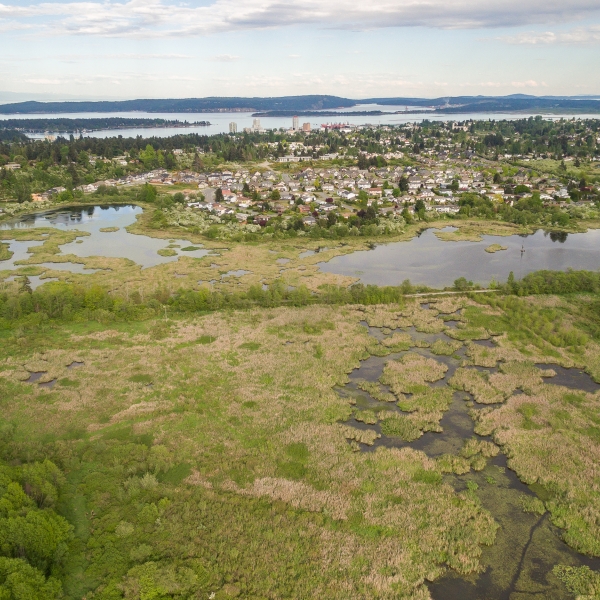First Year (all are required courses)
PLAN 501 - Introduction and History of Planning 3 credits
This course begins with definitions of land use planning, traces through thousands of years of planning thought, and then shifts to the history of Canadian planning. The range of ideas that fall under the term “planning” are discussed. This course necessarily addresses both theory and practice.
PLAN 502 - Planning Theory and Policy 3 credits
This course proceeds through the dynamic evolution of planning theory, touching on the philosophies and methodologies that have shaped the practice. It is established from the outset that there is no agreed upon “planning theory”; ideally the student will begin to understand their own approaches to planning.
PLAN 503 - Ethics and the Public Good 3 credits
This course investigates what is meant by the poorly understood term “the public good.” The course reaches through millennia of philosophical thought and across the social sciences and humanities. The second section of the course focuses on ethics and issues faced by practicing planners.
PLAN 504 - Community Design (Parts I & II, each 3 credits) 6 credits
This course will examine fundamentals in urban aesthetics, functionality, and design. Extensive field work (with the potential for field excursions out of the mid-Island area) will be required. The urban and rural environments experienced as part of this course will act as “living labs” for course work and projects.
PLAN 505 - Planning Law and Regulations 3 credits
This course delves into the legal concepts and principles that must be understood by the practicing planner. An understanding of the legislation, regulations, and bylaws shaping the practice is the key outcome of this course. The roles of decision-makers and citizens from a legal perspective are also examined.
PLAN 506 - Planning Practice 3 credits
This course explores the skills, knowledge, and experiences essential for the practicing planner. The class will be involved in the evolution of a planning proposal, following it through from the development of the application to completion. Projects from minor variances to mega projects will be considered.
PLAN 507 - Research Methods 3 credits
This course considers the qualitative and quantitative research methods required by the planner. Social research methods such as interviews, observational research, survey development, and statistical analysis will be considered. The student will be required to complete a research design applicable to their area of focus.
Total credits in year 1: 24 credits
Second Year (required courses)
PLAN 600 - Advanced Studio (Internship) 3 credits
This course is an intensive experience that focuses on a specific planning/design issue for a client. The applicability of different approaches will be considered, including the implementation of new standards for the built environment and infrastructure. Students will work through the design process from concept to execution.
Prerequisite: PLAN 504.
PLAN 601 - Citizen Participation and Consultation 3 credits
Public consultation and the legislative requirements for public process are examined and methods for working with citizens’ groups and stakeholders are reviewed. Extensive class time will be spent on case studies and analyses of best practices for different consultation situations.
PLAN 606 - Advanced Planning Practice 3 credits
Building on PLAN 506, this course adds new skills and knowledge important to planners, in both public and private work environments. Focus areas include land economics, pro formas, and understanding the application process. Field work will be required.
Prerequisite: PLAN 506.
PLAN 620 - Topics in First Nations Land Use & Community Planning 3 credits
An examination of the historic and current issues relevant to First Nations land use and community planning. Topics will vary by offering but will focus on subjects of significance to the profession and practice. The course may not be repeated for credit.
Research Option
When registering for 2nd year, students will choose either a Major Project or Thesis (both at 9 credits).
PLAN 690 - Major Project 9 credits
A student may complete degree requirements with a professionally oriented project. The process and format for completion of the major project must meet all university requirements. The student must pass an oral exam on the subject of the major project. This course is graded pass/pass with revisions/fail.
Additional credits required if registered in PLAN 690 (3 credits)
PLAN 691 - Thesis 9 credits
The thesis must show that the student has a mastery of their field of research. The process and format for completion of the thesis must meet all university requirements. The student must pass an oral exam on the subject of the thesis. This course is graded pass/pass with revisions/fail.
Additional credits required if registered in PLAN 691 3 credits
Total credits in year 2: 24 credits
Elective Options
Several optional courses may be offered to enable students to fulfill degree requirements.
PLAN 602 - Planning for Sustainability 3 credits
This course examines theoretical frameworks and theories in sustainability at local, provincial, national, and global levels. The focus of this course is on improving the student’s understanding of issues relating to sustainability and ultimately to the transformational change that is needed in governance and land use planning.
PLAN 603 - Fundamentals of GIS 3 credits
This course covers the theory, history, and use of GIS for the planner. It is intended for students with limited experience in GIS who wish to gain a basic understanding of the use of spatial data. Students holding a VIU ADGIS may not take this course for credit.
PLAN 604 - Literature of Planning 3 credits
This course is an intensive reading program on the key texts in land use planning. The course will allow the student to hone skills in analysis and advance the student’s understanding of theories, practices, the evolution of planning thought, and current issues in the profession.
Additional optional courses will be offered in different formats every calendar year. These courses are designed to round-out the experiences offered to the student through the program, and will be offered depending on faculty availability. Generally, sessional or adjunct professors will teach these courses with expertise in a specialized knowledge area: the instructor will establish course content.
PLAN 621 - Topics in Design and Aesthetics 3 credits
This special topic course focuses on architecture, urban design, and the aesthetics of rural and urban spaces and places. Topics will vary by offering but will focus on subjects of significance to the profession and practice. The course may not be repeated for credit.
PLAN 622 - Topics in Municipal and Regional Planning 3 credits
This special topic course focuses on the local governments and the issues that will be faced by the practicing planner. Topics will vary by offering but will focus on politics and problems relevant to the profession. The course may not be repeated for credit.
PLAN 623 - Topics in Evolving Issues in Planning 3 credits
A thorough examination of an important present-day issue, trend, or concept in community and land use planning. Topics will vary by offering but will focus on a subject of significance to the profession and practice. The course may not be repeated for credit.
The one credit courses shown below are being changed to the Urban and Regional Planning Certificate in 2019/20. Six courses will be offered each year to students, and will address the topics formerly covered in PLAN 624.
PLAN 624 - Issues in Community Planning 1 credit
These are short-term courses focused on a specific issue or aspect of planning and/or a related discipline. The contact time for these courses will range from 12 to 15 hours, enabling the course to be completed over 2-3 days, several evenings, or through a weekend offering. Lab or field components may be included in the course requirements. Topics will vary, but will include:
- Project Management
- Archeological Assessment
- Retail Planning
- Vector Works/CAD
- Project Economics
- Presentation Graphics
- Planning for Community Amenities
- Community Servicing Issues
- Community Water Planning
- Stormwater Management
- Project Financing
- Approval Processes
- Negotiation and Mediation
- Social Enterprise
- Economic Development
- Emergency Planning
- Real Estate Practice
- Asset Management
- Food Systems
- Liquid Waste Management
- Alternative Transportation
- Planning and Digital Media
A field-based program may be offered in either Spring Break or immediately following the completion of Spring classes.
PLAN 508 - Field Studies (1), 509 (II), and 510 (III) 3 credits each
An intensive field-based study of community/urban planning issues in a specific region of interest. Topics will vary, but will typically include built landscapes, city systems, urban design, sustainability, urban morphology, socio-economic issues, and environmental aesthetics. International travel may be required. PLAN 508 can be offered as a stand-alone 3 credit field school, or can be combined with 509 and 510 to create a 6 or 9 credit field school.
A Directed Study requires working one-on-one with an instructor with expertise in that particular area.
PLAN 650 - Directed Study 3 credits
A research project designed to address individual student interests in a defined area of planning. Projects will typically include some combination of intensive research, analysis, and may involve fieldwork. May be repeated once for credit.
Depending on the interests of the student, there may be an option to take courses outside of the MCP Program at VIU or at a partner university. It is anticipated that the student will identify these options and discuss them with the Program Director as early as possible in the student’s program.












